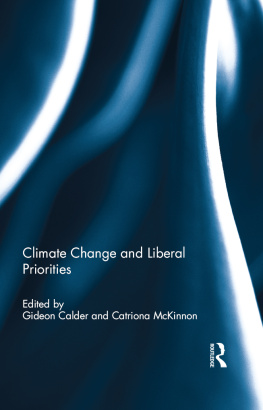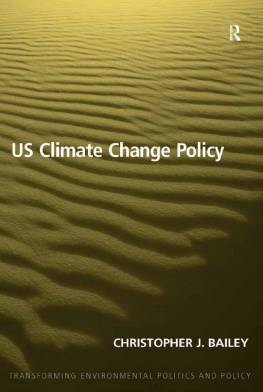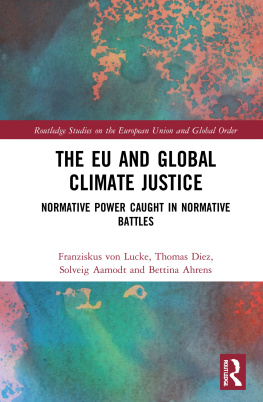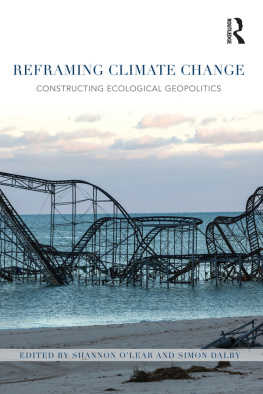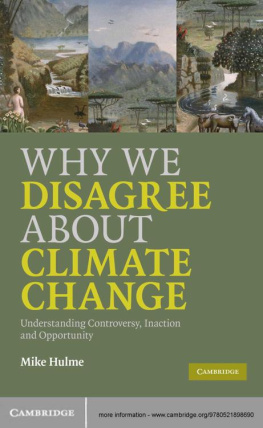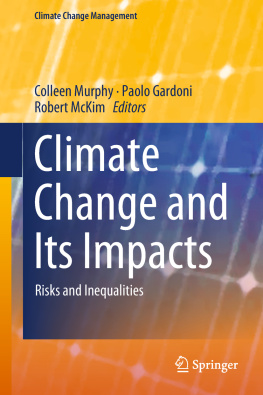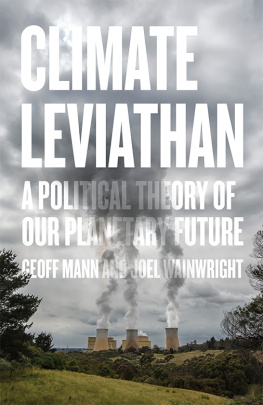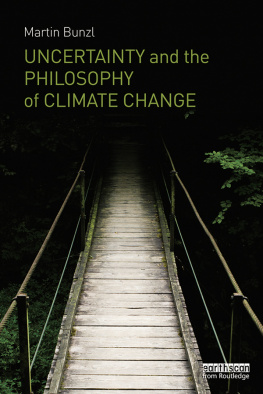Climate Change and Liberal Priorities
Liberalism dominates the academy in the early 21st century and meanwhile climate change looms as large as any political challenge. Is liberalism up to that challenge? Do its values, methods and assumptions equip it for the job? Are environmental emergencies best seen as a threat to liberalism, or an opportunity for it to show its worth? This book offers fresh arguments by leading scholars some sceptical of liberalisms capacity to meet these challenges, and others more sympathetic to the project of developing a distinctively liberal route to climate change justice. The analyses here reveal the complexity of the issues at stake in the real world of climate change politics, and appeal to new insights and considerations vital to their negotiation. They make the political theory of climate change justice available to the decision-makers whose practice will determine whether, or to what extent, such justice is achieved.
This book was previously published as a special issue of Critical Review of International Social and Political Philosophy.
Catriona McKinnon is Professor of Political Theory at the University of Reading. She is the author of Liberalism and the Defence of Political Constructivism (2002), Toleration: A Critical Introduction (2006), and Climate Change and Future Justice: Precaution, Compensation and Triage (2011). She has published widely on liberal theory, toleration, equality, and issues in applied political theory, and is currently working on liberal approaches to climate change justice.
Gideon Calder is Reader in Ethics and Social Philosophy at the University of Wales, Newport. He has written two books on Richard Rortys philosophy, and is co-editor of Liberalism and Social Justice (2000), Citizenship Acquisition and National Belonging (2009), Diversity in Europe: Dilemmas of Differential Treatment in Theory and Practice (2011), and the forthcoming Changing Directions of the British Welfare State. He is currently writing a book on democracy.
To Caelan, Bria, Kristian and Megan all of whom arrived between the conception of this book and its appearance in print
Climate Change and Liberal Priorities
Edited by
Gideon Calder and Catriona McKinnon
First published 2012
by Routledge
2 Park Square, Milton Park, Abingdon, Oxon, OX14 4RN
Simultaneously published in the USA and Canada
by Routledge
711 Third Avenue, New York, NY 10017 (8th Floor)
Routledge is an imprint of the Taylor & Francis Group, an informa business
2012 Taylor & Francis
This book is a reproduction of the Critical Review of International Social and Political Philosophy, vol. 14, issue 2. The Publisher requests to those authors who may be citing this book to state, also, the bibliographical details of the special issue on which the book was based.
All rights reserved. No part of this book may be reprinted or reproduced or utilised in any form or by any electronic, mechanical, or other means, now known or hereafter invented, including photocopying and recording, or in any information storage or retrieval system, without permission in writing from the publishers.
Trademark notice: Product or corporate names may be trademarks or registered trademarks, and are used only for identification and explanation without intent to infringe.
British Library Cataloguing in Publication Data
A catalogue record for this book is available from the British Library
ISBN13: 978-0-415-45340-0
Typeset in Times New Roman
by Taylor & Francis Books
Disclaimer
The publisher would like to make readers aware that the chapters in this book are referred to as articles as they had been in the special issue. The publisher accepts responsibility for any inconsistencies that may have arisen in the course of preparing this volume for print.
Contents
Gideon Calder and Catriona McKinnon
Derek Bell
Stephen M. Gardiner
Gideon Calder
Elizabeth Cripps
Catriona McKinnon
Simon Hailwood
Nicole Hassoun
Edward A. Page
Gideon Caldera and Catriona McKinnonb
aSocial Ethics Research Group, University of Wales, Newport, UK; bDepartment of Politics and International Relations, University of Reading, Reading, UK
It is over two decades since climate change broke into the mainstream of public consciousness in the Western liberal democracies, duly to become a routine part of media and street-level discourse. Yet considering the nature and scale of the issues involved, it remains striking how small a shadow climate change casts over political life. It has yet to dominate (or substantially punctuate) an election campaign, or to swing a televized debate between presidential candidates. Evidence suggests it weighs ambiguously in the minds of politicians and voters and in the endless heavily than ostensibly more trivial and fleeting issues. It has strikingly little shoving power in terms of altering priorities. Thus, the publics concern about climate change, as one report flatly puts it, is at odds with its willingness to change everyday behaviour (Williams 2007, p. 23). While, according to a recent UK poll, 85% of us endorse statements that climate change is either already a threat or will threaten future generations unless action is taken, we are very much less supportive of suggested changes that might force us to live differently (Glover 2009, p. 2). So when it comes to strategy on climate change, both street-level common sense and political wisdom sit somewhere quite separate from the scientific consensus. This would not be so remarkable were the scientific issues arcane, or their implications marginal. But neither of these applies with climate change. An issue which just because of its sheer magnitude and global reach we might expect to have forced a thorough rewriting of the lexicon of mainstream politics and major shifts in the discourse of civil society has in fact done relatively little, in a deep way, to reorientate the orthodoxies of either.
Meanwhile in the academy, climate change has become mainstreamed, if slowly, as a topic across the humanities and social sciences as well as in the natural sciences. This is a field in which events move on at a rate that generates its own momentum. In the period between the UK government-commissioned Stern Review on the Economics of Climate Change (2006) and the UN Copenhagen Climate Change Conference (2009), this momentum has intensified, and the pace of debate has increased. In political theory and ethics, the past half-decade has seen ever more events, and collections such as this one, placing climate change in different contexts: the ethics of sustainability, global justice, the relationship between social and environmental justice. Yet here too, the seeping-in of climate change to the academic agenda has left the wider landscape conspicuously intact. Very few have found that its impact has shaken up their normative frameworks in any big way, or made them reorder their priorities, or their syllabuses. Rather, climate change is typically just added to the regular itinerary political obligation, multiculturalism, global justice, the nature of rights as if each of these were, as problems, on a par. The presumption is often that once up and running, our familiar conceptual frameworks can be applied, with minimal tweaking at most, to each such problem in turn. Thus the climate-changing world, viewed from within those frameworks, remains much as it was. The broad Left finds further grist to the mill of its critique of capitalism. Conservatives find further evidence of the ills of modernity. And liberalism to which, in one way or another, the vast majority of contemporary political philosophers are committed tends not to have been lured from its post-Rawlsian orthodoxies.

